
Bi- Annual Report October 2024-May 2025- Final.
Download full report Download summary report

Download full report Download summary report

Download full report Download summary report
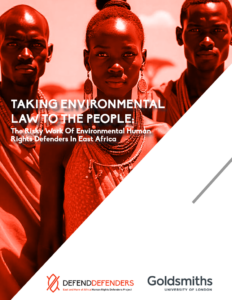
Confronting the climate and ecological emergency in East Africa depends not only on crafting robust environmental laws and policies, but also on supporting lawyers and civil society actors who strive to monitor and uphold them. This brief focuses on a persistent problem that environmental human rights defenders (EHRDs) are undervalued and unprotected by governments and international actors. It sets out progressive environmental regimes and commitments adopted by governments in this region as a reminder of their existing obligations. It illustrates how EHRDs work as intermediaries
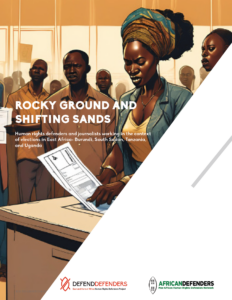
Africa is entering a busy election schedule, with numerous countries holding elections in 2024, 2025, and 2027. This report examines upcoming elections in Burundi, South Sudan, Tanzania, and Uganda, highlighting the challenges and risks faced by HRDs, especially those working on the electoral processes, pro-democracy activists, journalists, political parties (mostly those in opposition), and local communities in these nations. It emphasizes the citizens’ strong desire to express their voices in a safe environment and the potential impact of election processes and outcomes on human rights.
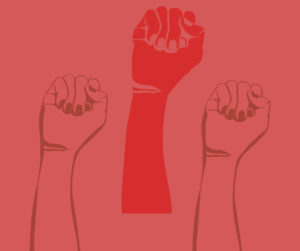
Download full report Download summary report
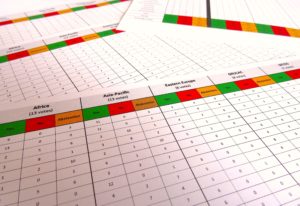

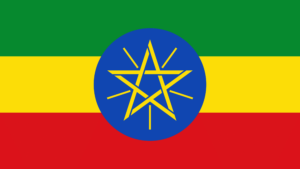
CIVICUS is a global alliance of civil society organisations (CSOs) and activists dedicated to strengthening citizen action and civil society around the world. Founded in 1993, CIVICUS has members in more than 180 countries throughout the world. The East and Horn of Africa Human Rights Defenders Project (DefendDefenders) is a regional CSO registered and based in Uganda. Established in 2005, DefendDefenders seeks to strengthen the work of human rights defenders (HRDs) throughout the East and Horn of Africa region by reducing their vulnerability to the
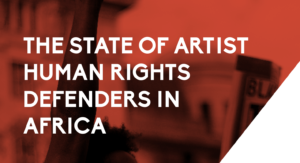
Artists have a unique power of bringing people together, promoting change and raising awareness on social issues. Considering their ability to create visual interest and to promote solidarity and awareness, artists play a pivotal role in society by promoting human rights, especially in the modern age, where people rely heavily on technology and media. Furthermore, artists have contributed significantly towards achieving revolution and system changes across Africa. In South Africa for example, the Southern Africa National Gallery played a key role in the resistance art
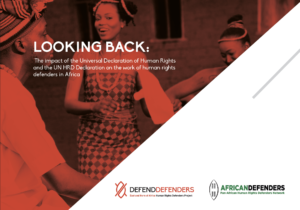
2023 marks the 75th anniversary of the Universal Declaration of Human Rights (UDHR). While the principles of the UDHR and the HRD Declaration remain relevant, it is important to reflect on their impact and potential gaps between their promises and the reality on the ground. While the two declarations have inspired the establishment of a number of regional and international human rights instruments and mechanisms, issues persist globally that limit the full enjoyment of universal rights. In its annual report for 2022, Freedom House reported that
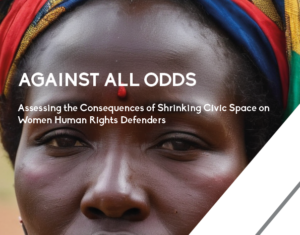
South Sudanese women have been pivotal in the pursuit of peace and human rights, from the Comprehensive Peace Agreement (CPA) of 2005 to subsequent peace agreements which ultimately led to the Revitalized Agreement on the Resolution of the Conflict in the Republic of South Sudan (R-ARCSS). Despite their resilience and significant contributions, WHRDs in South Sudan face a hostile environment shaped by deeply entrenched patriarchal values.In addition to gender-based challenges, WHRDs much like other HRDs, encounter intimidation, threats, stigmatisation, legal restrictions, physical attacks, and criminalisation
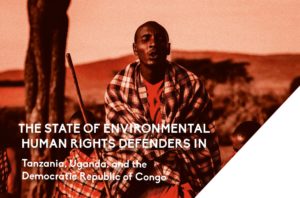
This report details the findings on the state of Environmental Human Rights Defenders (EHRDs) in Tanzania, Uganda, and the Democratic Republic of Congo (DRC). The study was commissioned by DefendDefenders under the project ‘Enhancing Protection of Environmental Defenders (EPED)’ in collaboration with the American Bar Association Rule of Law Initiative (ABA-ROLI). The project is an effort to understand the protection needs and existing gaps in order to formulate comprehensive resilience building support to those human rights defenders (HRDs) The study was participatory and consultative in


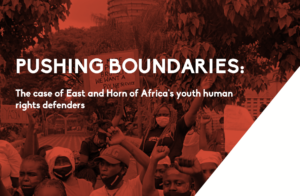
Pushing Boundaries: The case of East and Horn of Africa’s youth human rights defenders In a report published today, DefendDefenders and AfricanDefenders present a comprehensive summary of the case of East and Horn of Africa’s youth human rights defenders. The report focuses on understanding their working environment in the sub-region, mainly focusing on the countries where we conducted in-person interviews. It analyses the drivers that influence young people’s actions as HRDs, examines the emerging trends in youth mobilisation, assesses the needs of youth HRDs and
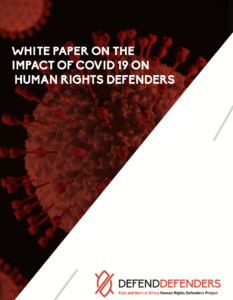
The coronavirus disease 2019 (Covid-19) pandemic is a serious global health crisis that has caused over six million deaths worldwide and continues to threaten many people’s health and livelihoods. The pandemic revealed fundamental cracks in national and global health systems. It has brought inequality within and between countries into sharp relief and tested our resilience as individuals and as members of communities. Considerable disparities in access to vaccines and vaccination rates persist, with 85% of people living in low income countries still waiting to receive the

Burundi On 29 June 2022, UN Special Rapporteur Fortuné Gaetan Zongo presented his first oral update to the UN Human Rights Council (Council). In his statement, he noted that despite the progress made since 2020, more needs to be done to combat impunity and strengthen institutions. Download full version Djibouti On 8 June 2022, the International Federation for human rights and the Ligue djiboutienne des droits humans released a joint report raising concerns over the Djibouti’s governments continued disregard of human rights, and rule of law. Download full
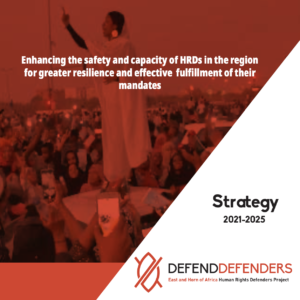
The DefendDefenders Strategy 2021-2025 has been developed through a process that included a review of the organisations identity; philosophy and theory of change; strategic focus areas, organisational roles; corresponding goals, interventions, and approaches. The strategy builds on the previous work done by DefendDefenders to deepen and consolidate its mandate in supporting and responding to Human rights Defenders (HRDs) at risk, by reducing their vulnerability to persecution and enhancing their capacity to effectively protect human rights. The strategy is a guide for DefendDefenders operations in the
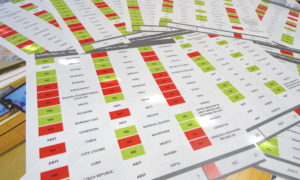
Between Principles and PragmatismHow African states vote at the UN Human Rights Council In a report published today, DefendDefenders and AfricanDefenders present a comprehensive analysis of the voting history, record, and behaviour of African states at the UN Human Rights Council. “Between Principles and Pragmatism” is an evidence-based analysis of patterns of votes for African Group. The report covers all votes on resolutions that ever took place since the Council’s creation, in 2006, namely from its 1st (HRC1) to its 50th session (HRC50). “Between
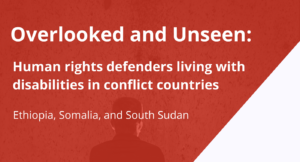
Today, 29 April 2022, DefendDefenders launched “Overlooked and Unseen: Human rights defenders living with disabilities in conflict areas,” – a report that highlights the grueling challenges that persons with disabilities (PWDs) including human rights defenders with disabilities face, and the numerous obstacles that stand between them and the full enjoyment of their inalienable human rights. From Somalia, to Ethiopia, to South Sudan, the report notes that PWDs face a common set of attitudinal, environmental, and institutional challenges by virtue of their disability, which are compounded

Somalia and Somaliland Somalia continues to face insecurity, conflict, and recurring drought due to climate change. The presidential election originally scheduled to take place in late 2020 is postponed until an agreement is reached. The lower house elections, initially scheduled for November to December 2021, have been postponed, and the deadline continues to be further extended.The swearing in ceremony for the newly elected lower and upper houses MPs is scheduled for 14 April 2022, however, some MPs from Jubaland and Hirshabelle have not yet been elected. In
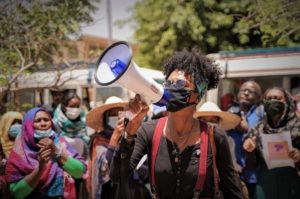
The situation of Human Rights Defenders in Sudan

Confronting the climate and ecological emergency in East Africa depends not only on crafting robust environmental laws and policies, but also on supporting lawyers and civil society actors who strive to monitor and uphold them. This brief focuses on a persistent problem that environmental human rights defenders (EHRDs) are undervalued and unprotected by governments and international actors. It sets out progressive environmental regimes and commitments adopted by governments in this region as a reminder of their existing obligations. It illustrates how EHRDs work as intermediaries

Africa is entering a busy election schedule, with numerous countries holding elections in 2024, 2025, and 2027. This report examines upcoming elections in Burundi, South Sudan, Tanzania, and Uganda, highlighting the challenges and risks faced by HRDs, especially those working on the electoral processes, pro-democracy activists, journalists, political parties (mostly those in opposition), and local communities in these nations. It emphasizes the citizens’ strong desire to express their voices in a safe environment and the potential impact of election processes and outcomes on human rights.

Download full report Download summary report



CIVICUS is a global alliance of civil society organisations (CSOs) and activists dedicated to strengthening citizen action and civil society around the world. Founded in 1993, CIVICUS has members in more than 180 countries throughout the world. The East and Horn of Africa Human Rights Defenders Project (DefendDefenders) is a regional CSO registered and based in Uganda. Established in 2005, DefendDefenders seeks to strengthen the work of human rights defenders (HRDs) throughout the East and Horn of Africa region by reducing their vulnerability to the

Artists have a unique power of bringing people together, promoting change and raising awareness on social issues. Considering their ability to create visual interest and to promote solidarity and awareness, artists play a pivotal role in society by promoting human rights, especially in the modern age, where people rely heavily on technology and media. Furthermore, artists have contributed significantly towards achieving revolution and system changes across Africa. In South Africa for example, the Southern Africa National Gallery played a key role in the resistance art

2023 marks the 75th anniversary of the Universal Declaration of Human Rights (UDHR). While the principles of the UDHR and the HRD Declaration remain relevant, it is important to reflect on their impact and potential gaps between their promises and the reality on the ground. While the two declarations have inspired the establishment of a number of regional and international human rights instruments and mechanisms, issues persist globally that limit the full enjoyment of universal rights. In its annual report for 2022, Freedom House reported that

South Sudanese women have been pivotal in the pursuit of peace and human rights, from the Comprehensive Peace Agreement (CPA) of 2005 to subsequent peace agreements which ultimately led to the Revitalized Agreement on the Resolution of the Conflict in the Republic of South Sudan (R-ARCSS). Despite their resilience and significant contributions, WHRDs in South Sudan face a hostile environment shaped by deeply entrenched patriarchal values.In addition to gender-based challenges, WHRDs much like other HRDs, encounter intimidation, threats, stigmatisation, legal restrictions, physical attacks, and criminalisation

This report details the findings on the state of Environmental Human Rights Defenders (EHRDs) in Tanzania, Uganda, and the Democratic Republic of Congo (DRC). The study was commissioned by DefendDefenders under the project ‘Enhancing Protection of Environmental Defenders (EPED)’ in collaboration with the American Bar Association Rule of Law Initiative (ABA-ROLI). The project is an effort to understand the protection needs and existing gaps in order to formulate comprehensive resilience building support to those human rights defenders (HRDs) The study was participatory and consultative in



Pushing Boundaries: The case of East and Horn of Africa’s youth human rights defenders In a report published today, DefendDefenders and AfricanDefenders present a comprehensive summary of the case of East and Horn of Africa’s youth human rights defenders. The report focuses on understanding their working environment in the sub-region, mainly focusing on the countries where we conducted in-person interviews. It analyses the drivers that influence young people’s actions as HRDs, examines the emerging trends in youth mobilisation, assesses the needs of youth HRDs and

The coronavirus disease 2019 (Covid-19) pandemic is a serious global health crisis that has caused over six million deaths worldwide and continues to threaten many people’s health and livelihoods. The pandemic revealed fundamental cracks in national and global health systems. It has brought inequality within and between countries into sharp relief and tested our resilience as individuals and as members of communities. Considerable disparities in access to vaccines and vaccination rates persist, with 85% of people living in low income countries still waiting to receive the

Burundi On 29 June 2022, UN Special Rapporteur Fortuné Gaetan Zongo presented his first oral update to the UN Human Rights Council (Council). In his statement, he noted that despite the progress made since 2020, more needs to be done to combat impunity and strengthen institutions. Download full version Djibouti On 8 June 2022, the International Federation for human rights and the Ligue djiboutienne des droits humans released a joint report raising concerns over the Djibouti’s governments continued disregard of human rights, and rule of law. Download full

The DefendDefenders Strategy 2021-2025 has been developed through a process that included a review of the organisations identity; philosophy and theory of change; strategic focus areas, organisational roles; corresponding goals, interventions, and approaches. The strategy builds on the previous work done by DefendDefenders to deepen and consolidate its mandate in supporting and responding to Human rights Defenders (HRDs) at risk, by reducing their vulnerability to persecution and enhancing their capacity to effectively protect human rights. The strategy is a guide for DefendDefenders operations in the

Between Principles and PragmatismHow African states vote at the UN Human Rights Council In a report published today, DefendDefenders and AfricanDefenders present a comprehensive analysis of the voting history, record, and behaviour of African states at the UN Human Rights Council. “Between Principles and Pragmatism” is an evidence-based analysis of patterns of votes for African Group. The report covers all votes on resolutions that ever took place since the Council’s creation, in 2006, namely from its 1st (HRC1) to its 50th session (HRC50). “Between

Today, 29 April 2022, DefendDefenders launched “Overlooked and Unseen: Human rights defenders living with disabilities in conflict areas,” – a report that highlights the grueling challenges that persons with disabilities (PWDs) including human rights defenders with disabilities face, and the numerous obstacles that stand between them and the full enjoyment of their inalienable human rights. From Somalia, to Ethiopia, to South Sudan, the report notes that PWDs face a common set of attitudinal, environmental, and institutional challenges by virtue of their disability, which are compounded

Somalia and Somaliland Somalia continues to face insecurity, conflict, and recurring drought due to climate change. The presidential election originally scheduled to take place in late 2020 is postponed until an agreement is reached. The lower house elections, initially scheduled for November to December 2021, have been postponed, and the deadline continues to be further extended.The swearing in ceremony for the newly elected lower and upper houses MPs is scheduled for 14 April 2022, however, some MPs from Jubaland and Hirshabelle have not yet been elected. In

The situation of Human Rights Defenders in Sudan
Address:
Arie Towers
Plot 16, Mackinnon Road
Nakasero P.O. Box 70356,
Kampala, Uganda
General Phone Line:
+256-200-760-700 (General)
24/7 Emergency Phone Line: +256 707 020086